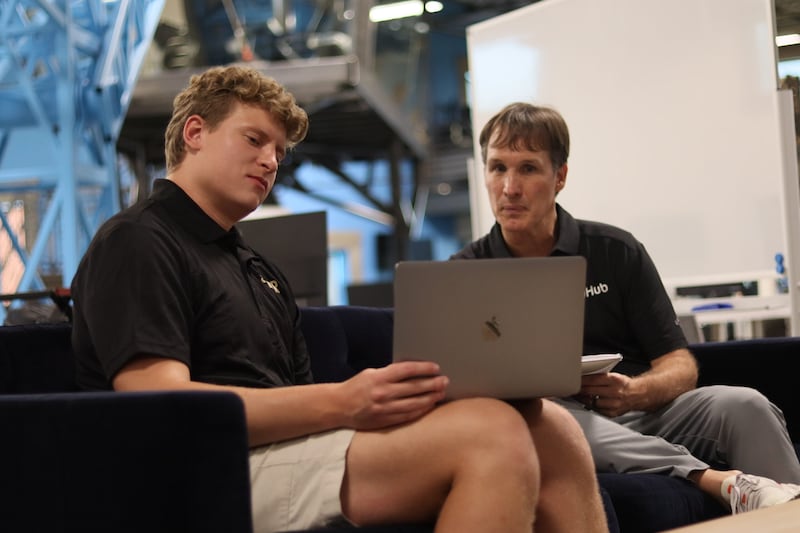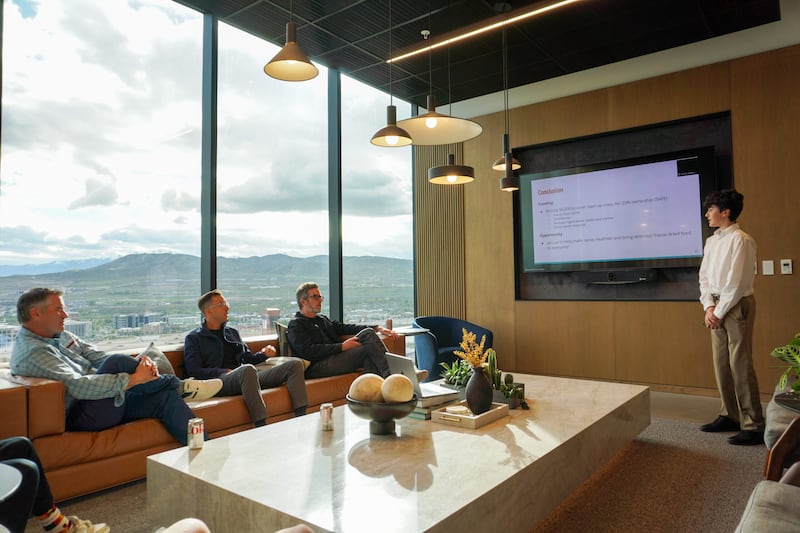This story appears in the August issue of Utah Business. Subscribe.
There was a time when the traditional bank financing of very predictable business plans allowed firms to be born as walking, talking toddlers. Small businesses sprang into existence looking like scaled-down versions of large businesses, with most of the expected operational components present from day one, including a physical facility and a product or service ready to sell.
The internet spawned myriad business plans full of extreme unpredictability on the one hand and potential for extreme scalability on the other. Banks weren’t interested, but venture capitalists were. The result has been what we all know today as the startup, which has less in common with a toddler than it has with an infant born about two months early: in a state of extreme fragility, with many vital components yet to be developed.
Like a prematurely born human, a startup’s best chance to get beyond minimum viability is to be nurtured in an incubator. In both medical and business settings, incubation doubles survival rates.
Cultivating companies from seed
The first internet-era startup incubator was Y Combinator (YC), a cohort-based, three-month-long program that provides early-stage startups with seed funding, mentorship and professional services. That’s where Doug Barnett found vital support for Remi, his fledgling AI-powered roofing marketplace.
“Unlike a typical 23-year-old startup founder, I started Remi as a fairly seasoned business person,” says Barnett, who left his role as SVP at Vivint to start the company. “Then I went through YC and realized I knew nothing about startups. I learned that a startup’s world, right down to the language it uses to describe it, is completely different from an established business, even a traditional small business.”
Though YC only lasts three months, graduates remain connected with the program long after. Barnett reports frequent conversations with the mentors he bonded with there. As further testament to the way startup life defies common convention, Barnett’s three months at YC and nearly three-year tenure as founder of Remi more than qualifies him to play a mentor role to more recent founders, something he does at iHub, the newest entrant in Utah’s thriving business incubator scene.

One of Barnett’s iHub mentees is Jimmy Watson, founder and chief eating officer at Savor. When listing the benefits of being accepted into iHub, Watson starts by describing the office space itself — which he gets for free — but quickly adds that the cost savings are almost beside the point.
“A lot of other teams are also there working, and the space is very open and conducive to both getting heads-down work done and collaboration. We can get advice from other teams that have gone through the same challenges we’re facing,” Watson says. “The mentorship has been amazing. There’s free legal help and so many other resources I wish I’d had access to [when starting my first business].”
How does an incubator run?
Some incubators, including YC, are for-profit entities motivated by the equity stake they take in member startups. Incubators classified as nonprofit are either university-affiliated or funded by donations, grants or public money. Nonprofit incubators like iHub are motivated by the economic development of their communities, though iHub founder Corbin Church seems motivated to help startups succeed simply because he loves doing it.
“The first thing an incubator does that’s truly special is harness the energy a group feels when everyone knows they’re all going through something together,” Church says. “Starting a business can be frightening, but being able to go on that journey alongside dozens of other entrepreneurs gives you courage and provides a resource for ideas and advice. Bringing 100 young entrepreneurs together in one coworking space makes magic happen.”
Church says the concept for iHub initially came to him as a way of solving a separate problem he encountered while teaching entrepreneurism at Brigham Young University (BYU). Students eager for more knowledge began consuming excessive amounts of his time outside of the classroom. Determined not to leave any question unanswered, Church first started hosting group mentoring sessions, but even those failed to keep up with demand.
“I knew I had students three or four years ago who could answer all these questions but only if everyone were all in the same location,” Church says. “The incubator became the solution.”
A home for visionaries
When referencing the roles vital to business incubation, Church lists the entrepreneurs and mentors, obviously, but also subconsciously assigns a sort of personhood to the physical space itself. In this relationship, Church was not going to settle for anything less than a perfect match. He also knew that finding and paying for the right space — leasing 15,500 square feet near a university being the biggest line item on his cost projection by far — would be challenging. Church approached doTERRA co-founders Greg Cook and Corey Lindley for help. By the time that conversation was over, Church had secured iHub’s co-working space on the doTERRA campus at essentially no charge.
As with most acts of altruism, doTERRA’s was not purely selfless. doTERRA Chief of Staff Mark Wolfert, Jr. explains that going into the pandemic, the company employed 1,000 customer support agents, almost all area university students. Then COVID-19 came, leaving the company with a literal and spiritual void to fill.
“When the pandemic hit, we sent all our employees to work from home. As our workforce started to return, it made more sense to allow those call center workers to stay remote. We realized we missed the energy that those younger workers brought to our campus,” Wolfert says, adding that iHub now occupies what had been doTERRA’s call center. “Our main goal is supporting economic growth in Utah County, but there’s no doubt that having the iHub founders and mentors with us has been inspiring. We hear their stories and see them working hard with their lights still on late at night, and the rest of us can’t help but feel motivated to do the same.”
All available space at iHub filled within weeks and demanded the launch of iHub 2.0, located just two blocks from BYU.
“The doTERRA organization will now play the role of business accelerator, with the Provo location serving as incubator,” Church says, adding that accelerators are the right venue for startups generating some revenue and taking on employees, while incubators are best suited to earlier stage companies.
When discussing startup incubators with Church, the importance of physical proximity is repeatedly mentioned, beginning with the need for founders and mentors to be in the same room and extending to the incubator’s location.
“You need to be close to a university. College-age students are your demographic, and that’s where you’ll find them, even if they’re not in school,” Church says. In this case, “close” ideally means within walking distance.
Where are the startup incubators in Utah?
The Doman Innovation Studio (DIS), founded by entrepreneur and investor Curt Doman, is one Salt Lake County-based incubator that has reduced the distance separating it from a university campus to zero.
“I was looking for ways to give back that involved more than just writing checks. I wanted to use my expertise to help young entrepreneurs get launched by helping them solve that next thing in their problem stack, whatever it may be,” Doman says. “I could have done it completely on my own, but it made more sense to partner with the University of Utah (the U), and I found they were asking for it as much as I was looking for it.”
Cord Bowen, the studio’s director, says DIS has two important mandates, one being to fill a specific gap in the U’s entrepreneurial support spectrum.
“[The U’s] Lassonde Entrepreneur Institute is the beginning of beginnings, where ideas are trying to be formed. It gets you past the first steps,” Bowen says. “Doman is designed to fit in between Lassonde and the U’s Master of Business Creation program.”
The U is a research-intensive institution, and research produces patents. Indeed, the U has been ranked as the top university in the country when it comes to selling patents to private industry. This technology transfer generates revenue, which is a short-term boon to the U, but the long-term economic benefit of that innovation is ultimately enjoyed by the areas where those patents end up.
The second mandate at DIS is to redirect that inventive vigor.
“They’ve asked us to come into the workflow so that we stop sending the patents away and start getting more local companies coming out of it,” Bowen says.

Where ideas take root
Incubator founders are a certain type, and a look at their CVs confirms that Doman and Bowen fall right in line. However, a look at the companies being incubated calls all assumptions into question. Where you’d expect to wade into a sea of homogeneous founders — each building a SaaS, social or sharing economy app — you instead find an especially diverse group venturing into worlds as analog as clothing brands and cultural exchange events.
“If we’ve got an entrepreneur who’s willing to work hard and wants to use us as a resource, we’re not concerned with what the product offering is. In the beginning, it drove me crazy how many sweatshirt companies we saw,” Doman says with a laugh. “But it’s what these kids know, and we just want to get them past the next step, whatever it may be.”
For early-stage startups, a looming next step is always money. Helping great ideas attract investment is where DIS adds special value.
Brad Moss, founder and CEO at Enhanced.ai, says a five-minute elevator pitch meeting with Doman got the ball rolling. That led to an hour with Bowen, who then invited Moss and Head of Product Edgar Cheney into the studio where the real work began.
“We had a 2.5-hour-long meeting with Curt where we talked about our company’s pros, cons, strengths and weaknesses, including ways to shore up the weaknesses,” Moss says, adding that conversation yielded invaluable strategic advice on reaching product-market fit — likely the most important stage of the startup lifecycle, akin to an incubated infant gaining the ability to breathe and eat on its own.
Do you need an incubator for your startup?
While the concept of startup incubators may sound like all upside, nothing truly is. At a roundtable on venture capital hosted by Utah Business in June, the topic of incubators did not elicit uniformly positive comments.
“I actually have a little bit of a negative view of incubators. It’s a demerit,” John Mayfield of Album VC said. “Could they not figure out stuff for themselves? Because navigating the world is one of the key skills I think an entrepreneur needs.”
In that same setting, Cory Cozzens of Philo Ventures said that, depending on the terms, association with some for-profit incubators presents a striking red flag.
“Are those services — whether it’s space or equipment or legal advice or CFO work — actually accretive to building equity value in that company? We’ve seen accelerators or incubators take 20 or 30 percent ownership in a company for offering legal and tax advice,” Cozzens said. “I say an entrepreneur willing to give up so much equity in their company in exchange for legal or tax advice does not make good decisions.”
The standard YC deal is an equity stake of at least 7 percent in exchange for $500,000 — that’s $125,000 for the initial stake and $375,000 that gets marked at the best available terms on the next fundraising round. Ignoring dilution and assuming a seed-round pre-money valuation of $15 million, YC would come away with approximately 9.5 percent. These are considered “founder-friendly” terms.
YC graduate Barnett recognizes that not all incubators are motivated by the best intentions, but those that are spark an enduring virtuous cycle.
“Though most of the startups [in an incubator] will go to zero, a few will be very big and will have learned what it means to be in a great incubator environment, and I expect they’ll encourage the next batch of founders to do the same thing,” Barnett says.


